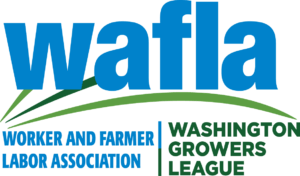Labor recruiter WAFLA offers money management classes for farmworkers

Labor recruiter WAFLA offers money management classes for farmworkers
Capital Press
By Don Jenkins
About 25 foreign farmworkers in north-central Washington are taking classes to help them become more savvy about banking and investing the money they make while in the U.S.
The classes are offered by WAFLA, which obtains seasonal workers, mostly from Mexico, for farmers in Washington and Oregon. WAFLA has ambitions to promote financial literacy among farmworkers nationwide.
"We hope we can make it much larger," WAFLA CEO Enrique Gastelum said. "We want to educate farmworkers to navigate this world."
The farmworkers are attending classes on Friday evenings at WAFLA's worker housing in Okanogan County. The four classes cover topics such as reading a pay stub, opening a bank account, filing tax returns and investing an income that's many times what was previously earned in Mexico.
Many workers have little financial experience. By learning to save and invest, workers can capitalize on their U.S. earnings long into the future, said Roxana Macias, WAFLA chief people and community officer.
"Our intent is to give them information they can use to create something larger," Macias said. "We want them to have more control over their earnings."
Stanford University researchers are studying the economic benefits for residents of Mexico who come to the U.S. on H-2A visas to work on farms. WAFLA is participating in the study.
By coming to the U.S., H-2A workers raise their pay by about $3,000 a month, enough to put their household incomes in the nation's top 10% and potentially lift families out of poverty, according to a university press release.
"For some of these guys, it's a drastic change in money," said Luis Guitron, WAFLA housing and field services director.
Workers commonly pay fees to cash checks and send money back to Mexico, he said. Some workers distrust banks, he said.
"I think it's important to get people educated on the banking system in the U.S. vs. Mexico," Guitron said. "It's basic stuff that saves them money in the long run."
Confusion over how wages are calculated and automatic deductions can make workers suspicious, according to organizers. Workers who understand pay stubs can also better spot discrepancies, they said.
WAFLA chief strategist Dan Fazio, who founded the organization, said the classes were inspired by watching farmworkers navigate complicated U.S. employment and financial laws.
WAFLA consulted tax, legal and teaching professionals in putting together the curriculum, he said. "We spent a lot of time working with a lot of smart people."
WAFLA has sketched out a plan to make the program nationwide over the next several years, though funding has not been secured.
"We have to find a path to transition it to an independent not-for-profit that does it," Fazio said. "Our ambition is to have every worker who gets an H-2A visa go through this program." That would be about 300,000 workers nationwide.
